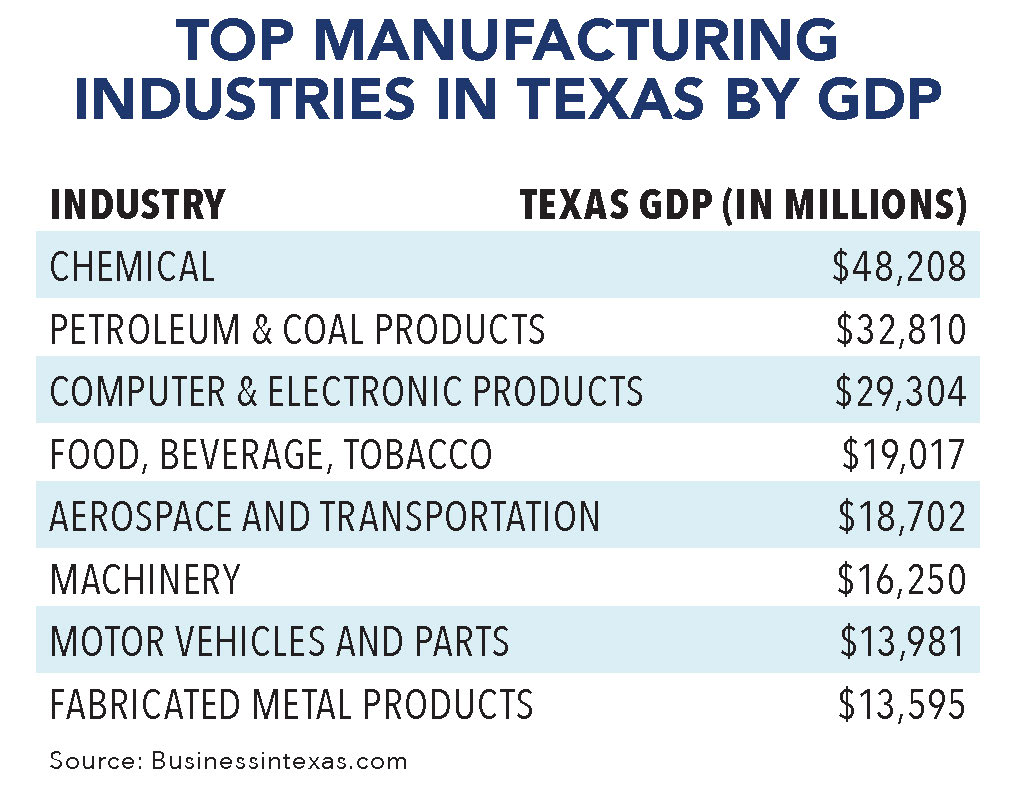Given its sheer size, it should come as no surprise that Texas consistently ranks as the nation’s No. 2 producer of manufactured goods. For more than two decades, the Lone Star State has led the nation in manufacturing exports, its total having hit a staggering $444.6 billion in 2023.
But what truly stands out about Texas is the breadth — and the increasing depth — of what it produces. Long a leader in sectors that include industrial machinery, chemicals, fabricated metals and food processing, Texas has vaulted into a leadership position among the industries that fuel today’s global economy, namely computers, computer chips, electric vehicles and EV batteries, solar panels, aircraft and rockets.
Perhaps nothing speaks to this as dramatically as how Elon Musk has embedded his leading-edge automotive and space enterprises within Texas’s business-friendly confines, citing such factors as lower taxes, affordable housing and ease of building. Having moved Tesla headquarters to Austin in 2021 from Palo Alto, California, Musk re-incorporated SpaceX from Delaware to Texas in February 2024. With a SpaceX launch facility, launch control center, tracking facility and production hub already established in and around Brownsville, the company recently launched construction of a $100 million office there to be completed in 2025.
Musk, who has famously declared Austin to be “the biggest boomtown that America has seen in 50 years,” now employs more than 20,000 people at his Gigafactory Texas, which made inaugural deliveries of the Tesla Cybertruck in November. Giga Texas is the country’s second largest factory by size, and now produces some 5,000 Model Y electric vehicles per week.
Tesla also chose Texas for a refining facility that’s to produce battery-grade lithium for the company’s expanding product line. Construction of the plant near Corpus Christi began in May of 2023 and is to create nearly 1,000 jobs, with employment at the completed facility expected to top 250. Tesla says the project represents an investment of more than $1 billion.
Semiconductors: Building Upon a Legacy
As the state where the integrated circuit was invented, Texas is aggressively and successfully courting the semiconductor industry, which increasingly underpins products from phones and laptops to cars and all manner of home appliances. Texas currently boasts more than 50 microchip facilities that employ close to 50,000 workers, the most of any state other than California.
In June 2023, Governor Greg Abbott signed the Texas CHIPS Act to further cement the state’s leadership position. The legislation created a $698 million Texas Semiconductor Innovation Fund to support semiconductor research, design and manufacturing projects. It also appropriates more than $660 million for the creation of advanced research and development centers at the University of Texas at Austin and Texas A&M University.

“Texas,” said Abbott at a signing ceremony, “is the birthplace of the chip that changed the world — and where the future of America’s semiconductor industry is already building.”
Over the past four years, Texas has attracted more than 60 semiconductor-related projects and expansions. Of those, 22 landed in the Austin-Round Rock region. In nearby Taylor, Samsung is nearing completion of a $17 billion chip plant announced in late 2021 during the same blockbuster week in which Dallas-based Texas Instruments announced plans for a $30 billion wafer fab in the town of Sherman.
The investments continue to roll in. With orders from the automotive industry surging, X-FAB Texas, an operating unit of Belgium’s X-FAB, announced plans in 2023 to pump $200 million into its silicon carbide wafer plant in Lubbock, in operation since 1999. X-FAB plans to bolster its 500-person workforce by 250 jobs over the next five years. Lubbock’s South Plains College recently opened a new technical training center, a potential pipeline for X-FAB, which relies on Texas Tech for much of its engineering talent.
Toppan Photomasks, which supplies companies including Samsung and Texas Instruments with a key component for creating semiconductor chips, is investing $185 million and creating 50 high-paying at its legacy plant in Round Rock. The expansion was encouraged by a $1.25 million incentive award approved by the Round Rock City Council in May 2023.
“Over the 35 years we have operated in Round Rock, the city, chamber and community have been vital partners to our growth,” said Toppan’s president John Nykaza. “That support allows Toppan Photomasks to add much needed capacity to meet the needs of consumers and enhance our capabilities to advance the growing U.S. semiconductor industry and bring manufacturing back to the U.S.”
Clean Energy Manufacturing
Committed as it is to its long-standing claim as the nation’s leader in oil and gas production, Texas is branching out to meet the accelerating demand for renewables. As 2023 came to a close, India-based solar panel maker Waaree Energies announced an ambitious plan to establish its first U.S. solar manufacturing site west of Houston. Located in the town of Brookshire, the facility is to have an initial capacity to manufacture 3 gigawatts of solar panels annually by the end of this year and up to 5 gigawatts by 2027, which would make it one of the largest solar module manufacturing facilities in the country. Waaree plans to invest up to $1 billion and create more than 1,500 jobs.
“Waaree,” said Chairman and Managing Director Hitesh Doshi, “is fostering a solar manufacturing ecosystem in Texas, a state that has taken a leading position in clean energy manufacturing.”
Also in December, John Cockerill announced its entry into the North American market with a new manufacturing complex in Baytown, Texas, where the Group will operate the first alkaline electrolyzer gigafactory in the United States. The facility is expected to produce 1 GW per year of electrolyzers, creating 200 jobs and bolstering Houston’s position as a hydrogen hub.
The formal groundbreaking of the new plant was celebrated at an event attended by the Prime Minister of Belgium Alexander De Croo, the John Cockerill Group CEO Francois Michel, and John Cockerill President Americas Nicolas de Coignac.
Prime Minister De Croo said, “Today’s ribbon cutting at John Cockerill’s Houston manufacturing facility is the first step into deepening the supply chain between Belgium companies and the Texas Gulf Coast.”
François Michel, CEO of John Cockerill, said, “We at John Cockerill look forward to growing our presence in the hydrogen sector in North America, following in the footsteps of many other large-scale activities that we have established in the U.S. in the energy, heavy industry and defense sectors since 2004. We have a long history of pushing industrial innovation all around the world. We see Belgium, as both one of the most solid gateways to Europe and one of the most vibrant innovation hubs of the continent. And we believe that there are many good reasons for Houston to play a similar role in North America.”

